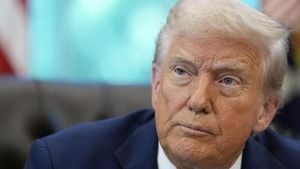A recent string of judicial and executive maneuvers in Washington, D.C. has reignited fierce debate over the balance of power between Congress and the presidency, particularly regarding who truly holds the nation’s purse strings. At the heart of the controversy is a D.C. appellate court ruling issued on August 12, 2025, which many observers say threatens to upend the longstanding constitutional principle that Congress alone controls federal spending. The decision, coupled with assertive new actions from President Donald Trump’s administration, has left lawmakers, legal experts, and the public grappling with the implications for the future of American democracy.
According to Newsweek, the case before the D.C. Court of Appeals revolved around whether President Trump had the authority to refuse to spend funds that Congress had already approved in the federal budget—a process known as “impoundment.” The court’s majority opinion held that only the comptroller of the United States could sue to stop the president from impounding such funds, effectively shutting out other parties, including those directly affected by the president’s decisions. This narrow interpretation, critics argue, leaves the enforcement of congressional spending mandates at the mercy of a single official.
Gene Dodaro, the current comptroller, is set to finish his term in December 2025. The timing is especially notable, as President Trump will have the authority to appoint Dodaro’s successor. That means, as Newsweek pointed out, the very person responsible for holding the president accountable for following the federal budget could soon be a Trump appointee. This scenario has raised alarms among those who worry about further erosion of checks and balances between the branches of government.
The controversy doesn’t end with the judiciary. On August 19, 2025, records reviewed by The Washington Post revealed that the Trump administration was actively asserting broad new authority to withhold billions of dollars from programs that Congress had already approved. The affected programs include low-income housing services, education assistance, and medical research grants. By centralizing this spending power in the executive branch, the administration’s actions have further inflamed tensions between Congress and the presidency, with many seeing it as a direct challenge to legislative supremacy in matters of federal expenditure.
For those who value clear constitutional boundaries, the stakes couldn’t be higher. The Constitution explicitly grants Congress the “power of the purse,” giving it sole authority to decide how public funds are spent. Historically, this power has been seen as a cornerstone of the separation of powers—a safeguard against any one branch accumulating too much control. Yet the recent court ruling, by restricting who can challenge presidential impoundment, appears to undermine this foundational principle.
Thomas G. Moukawsher, a former Connecticut complex litigation judge and co-chair of the American Bar Association Committee on Employee Benefits, minced no words in his Newsweek opinion piece: “The text is the law, and it is the text that must be observed.” He lamented that the appellate court’s decision ignored not only the letter of the law but also the clear intent of Congress. Moukawsher described the court’s reasoning as “jiggery-pokery,” accusing the majority of inventing legal distinctions that effectively neutered congressional authority. “Forgive them Nino!” he wrote, invoking the late Justice Antonin Scalia’s commitment to textualism.
At the core of the legal dispute is a law passed by Congress specifically to prevent presidents from unilaterally impounding funds. This law established strict procedures for how a president could ask Congress to cancel spending and authorized the comptroller to sue if the president ignored the budget. Crucially, the law also stated that the comptroller’s ability to sue “must not be seen as affecting in any way the claims or defenses of any party to litigation concerning any impoundment.” Yet, as Moukawsher and others have pointed out, the appellate court’s ruling appears to do exactly that—by excluding all parties except the comptroller from bringing such lawsuits.
One member of the three-judge panel issued a blistering dissent, underscoring the gravity of the majority’s decision. With 11 judges on the D.C. Court of Appeals, there remains the possibility that the case could be reheard by the full court. If not, the Supreme Court may ultimately be called upon to resolve the issue. Moukawsher noted that, contrary to popular belief, the Supreme Court has historically defended Congress’s exclusive spending authority, even overturning a law that granted the president a line-item veto on the grounds that it violated the separation of powers.
Meanwhile, the Trump administration’s aggressive moves to withhold funding from congressionally approved programs have only heightened concerns. According to The Washington Post, these actions reflect a broader attempt by the administration to centralize spending power within the executive branch—potentially setting a precedent for future presidents, regardless of party affiliation. The implications are far-reaching: if a single official, potentially handpicked by the president, is the only one with standing to enforce congressional spending mandates, what’s to stop future administrations from disregarding the will of Congress altogether?
Supporters of the court’s decision and the administration’s actions argue that presidents need flexibility to manage the budget, especially in times of fiscal uncertainty or shifting priorities. They contend that the comptroller’s unique role provides a necessary check without opening the floodgates to endless litigation. However, critics counter that this approach effectively removes a vital check on presidential power, threatening the very structure of American democracy.
The debate is not just academic. As Moukawsher provocatively asked, “Let’s say you support President Trump. How will you feel if he is replaced by President Zohran Mamdani, and the man has absolute power? Is that OK with you?” The question highlights a central concern: today’s expansion of executive authority could just as easily be wielded by a future president with very different priorities.
For now, the nation waits to see whether the D.C. Court of Appeals will revisit its decision or if the Supreme Court will step in. The outcome will shape not only the immediate balance of power in Washington but also the broader question of how—and by whom—America’s tax dollars are spent. As the debate rages on, one thing is clear: the fight over the power of the purse is far from over, and its resolution will have lasting consequences for the constitutional order.



